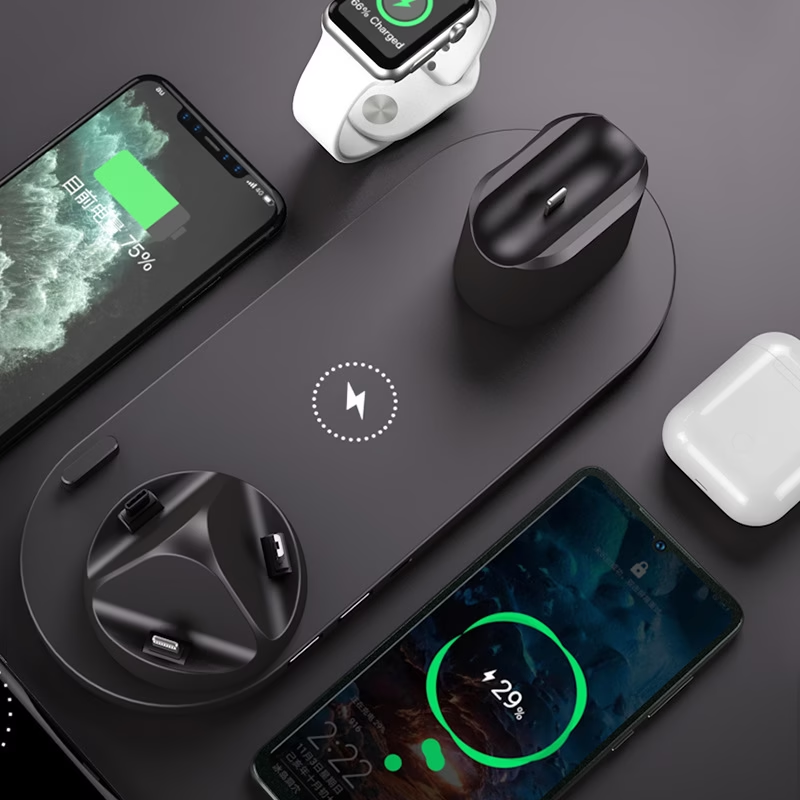Are wireless chargers safe? That’s a common question as more people switch to wireless charging for their phones and gadgets. It’s fast, easy, and gets rid of messy cables. Just drop your phone on a pad, and it starts charging.
This blog will answer that big question. We’ll look at how wireless charging works, the pros and cons, and how to choose a safe wireless charger. If you care about comfort and smart tech, keep reading.
Are Wireless Chargers Safe for Your Phone?
Wireless charging is easy and convenient, but many people still wonder about its safety. Let’s look at the most common concerns and how to make sure you’re using a safe wireless charger.
Can Wireless Charging Cause Overheating?
Overheating is one of the biggest worries. Some wireless chargers, especially cheap or low-quality ones, may cause your phone to get warm. While most smartphones have built-in safety features, using the wrong charger again and again can lead to more heat than usual. That heat can slow down your phone or reduce how well the battery works over time.
Does It Harm Battery Health?
This is another common question. The short answer is no—wireless charging is safe for your battery if you’re using a quality charger. Many wireless chargers are designed to stop charging once the battery reaches 100%. That helps prevent overcharging, which can damage the battery over time. But using a poor-quality charger may not stop in time, which could lead to battery wear.
What Makes a Wireless Charger Safe?
Look for a Qi-certified charger. “Qi” (pronounced “chee”) is the global standard for wireless charging safety and performance. If a charger has Qi certification, it has passed tests to make sure it works well and doesn’t cause harm to your phone. Brands that follow this standard are more reliable and help avoid overheating or damage.
So, are wireless chargers safe for your phone? Yes, as long as you choose a trusted, Qi-certified product. It’s a simple switch that can give you both safety and comfort every time you charge.
3. Are Wireless Chargers Safe for Humans?
Many people ask, “Are wireless chargers safe for humans?” The concern often comes from the fact that wireless chargers use something called EMF, or electromagnetic fields. Let’s break that down in simple terms.
What Are EMFs?
EMFs are invisible energy waves created by electrical devices. Wireless chargers use a type of EMF to send power from the charger to your phone without a cable. This sounds complex, but it’s actually very similar to how your phone connects to Wi-Fi or how a microwave heats food. The key thing to know is that not all EMFs are harmful. Some, like the kind from wireless chargers, are very weak.
Is This Radiation Harmful?
No. Wireless chargers give off a very low level of non-ionizing radiation. This kind is not strong enough to damage your cells or DNA. In fact, it’s the same kind of energy you’re exposed to when you use a TV remote, Wi-Fi router, or even walk outside in sunlight. So, wireless charging is safe for daily use around people—including children and pets.
Is Wireless the Same as Bluetooth?
Not quite. This is a common question: is wireless the same as Bluetooth? The answer is no, but they’re both safe. Wireless charging uses electromagnetic energy to send power. Bluetooth, on the other hand, sends data over short distances using radio waves. Both use low levels of EMF and are tested for safety.
So, when asking are wireless chargers safe for humans, the answer is yes. As long as you use a certified, quality charger, you can enjoy the comfort of cable-free charging without worrying about your health.

Pros and Cons of Wireless Charging
Pros of Wireless Charging
No Cables Needed
Wireless chargers remove the need for tangled wires. You simply place your phone on the pad and it starts charging. It’s quick, neat, and stress-free.
Cleaner Setup
Without charging cables everywhere, your desk or nightstand looks more organized. It creates a cleaner and more modern setup.
Less Wear on Ports
Since there’s no constant plugging in and out, your phone’s charging port stays in better shape. This can help your device last longer.
Drop and Charge Convenience
Wireless charging is easy. Just drop your phone on the charger and pick it up when you’re ready. It saves time and effort, especially when you’re in a rush.
Cons of Wireless Charging
Slower Charging Speeds
Wireless charging is usually slower than wired charging. If you’re in a hurry, a traditional cable may work better.
Can Get Hot
Some wireless chargers generate heat. If they get too warm, it may affect your phone’s battery over time, especially if you’re not using a safe wireless charger.
Less Energy Efficient
Wireless chargers waste a little more power. Not all the energy goes directly into your phone, so it’s not as efficient as a wired connection.
Precise Placement Required
Your phone must be placed properly on the charging pad. If it’s off-center, it might not charge or will charge slowly. That can be frustrating when you’re not paying close attention.
Understanding both sides helps you decide if wireless charging is the right choice—and helps you pick a charger that’s safe and reliable.
Final Thoughts: Should You Use a Wireless Charger?
Are wireless chargers safe? Yes—and for most people, they make daily life easier. They use low, non-harmful radiation and won’t hurt your phone if you use a safe wireless charger like the Qi-certified ones we offer at MarcoWind.
Picture this: You’re heading to bed. No need to fumble for cables—just drop your phone on the charger and sleep. Or you’re at your desk, jumping between calls. No plugging in, just grab and go. That’s the comfort wireless charging brings.
If you’re a busy professional, a student with a packed schedule, or just someone who likes a cleaner space, wireless charging fits your lifestyle. It’s not the fastest option, but it’s the most convenient. And when you buy from MarcoWind, you get reliable, safe tech that works.
So, skip the cables. Shop wireless chargers at MarcoWind today—and experience comfort powered by simplicity.
